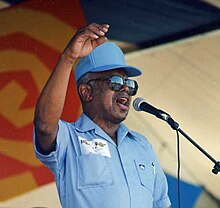James "Sugar Boy" Crawford: Difference between revisions
m Robot - Speedily moving category African American musicians to Category:African-American musicians per CFDS. |
No edit summary |
||
| Line 14: | Line 14: | ||
|occupation = Singer |
|occupation = Singer |
||
|years_active = 1950–1969 |
|years_active = 1950–1969 |
||
|label = [[Aladdin Records|Aladdin]], [[Chess Records|Checker Records]], [[Imperial Records|Imperial]], [[Specialty Records|Specialty]] |
|label = [[Aladdin Records|Aladdin]], [[Ace Records|Ace]], [[Chess Records|Checker Records]], [[Imperial Records|Imperial]], [[Specialty Records|Specialty]] |
||
|associated_acts = Davell Crawford, Snooks Eaglin |
|associated_acts = Davell Crawford, Snooks Eaglin |
||
|website = |
|website = |
||
Revision as of 12:55, 13 June 2012
James "Sugar Boy" Crawford | |
|---|---|
 James "Sugar Boy" Crawford making a rare appearance at the New Orleans Jazz & Heritage Festival, 1996 as a special guest for his grandson, Davell Crawford | |
| Background information | |
| Birth name | James Crawford |
| Born | October 12, 1934 |
| Origin | New Orleans, Louisiana |
| Genres | Rhythm and blues |
| Occupation(s) | Singer |
| Instrument(s) | Vocals, piano |
| Years active | 1950–1969 |
| Labels | Aladdin, Ace, Checker Records, Imperial, Specialty |
James "Sugar Boy" Crawford (born October 12, 1934) is a New Orleans R&B artist. He is the author of the classic "Jock-A-Mo" in 1954, a hit that was later recreated as "Iko Iko",[1] by The Dixie Cups and redone by many artists including Dr. John, Belle Stars, The Grateful Dead and Cyndi Lauper.
Starting out on trombone, he formed a band which local DJ Doctor Daddy-O named "The Chapaka Shawee" (Creole for "We Aren't Raccoons"), the title of an instrumental they played. Signed on by Chess Records president Leonard Chess, the group was renamed "Sugar Boy and his Cane Cutters".
Although his song became a standard at the New Orleans Mardi Gras, Crawford himself disappeared from public view, and in a 2002 interview for Offbeat, told how his career came to an abrupt halt in 1963 after a severe beating which incapacitated him for two years, forcing him to leave the music business. In 1969, he decided to limit his singing to in church only.[1]
Crawford appeared on his grandson Davell Crawford's 1995 CD Let Them Talk.[2] He has since made some stage appearances with Davell as well including the one at the New Orleans Jazz & Heritage Festival[1] (1996), and most recently at the 7th annual Ponderosa Stomp in April 2008.[3]
Among the artists Crawford has recorded with are guitarist Snooks Eaglin.
